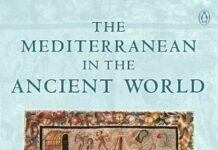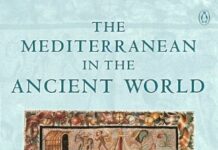
Ebook Info
- Published: 2011
- Number of pages: 553 pages
- Format: PDF
- File Size: 4.77 MB
- Authors: Fernand Braudel
Description
A grand sweep of history by the late Fernand Braudel–one of the twentieth century’s most influential historians–Memory and the Mediterraneanchronicles the Mediterranean’s immeasurably rich past during the foundational period from prehistory to classical antiquity, illuminating nothing less than the bedrock of our civilization and the very origins of Western culture.Essential for historians, yet written explicitly for the general reader, this magnificent account of the ebb and flow of cultures shaped by the Mediterranean takes us from the great sea’s geologic beginnings through the ancient civilizations that flourished along its shores. Moving with ease from Mesopotamia and Egypt to the flowering of Crete and the early Aegean peoples, and culminating in the prodigious achievements of ancient Greece and Rome, Braudel conveys in absorbing detail the geography and climate of the region over the course of millennia while brilliantly explaining the larger forces that gave rise to agriculture, writing, sea travel, trade, and, ultimately, the emergence of empires. Impressive in scope and gracefully written, Memory and the Mediterraneanis an endlessly enriching work of history by a legend in the field.
User’s Reviews
Reviews from Amazon users which were colected at the time this book was published on the website:
⭐Braudel is a master. The book begins with prehistoric man on the shoreline and moves from there. Not always an easy read, but worth the effort if you find the Mediterranean interesting.
⭐_Memory and the Mediterranean_ is a previously unpublished book by French historian Fernand Braudel, one written in the 1960s and originally intended to be part of a larger series. Set aside with the death of the author’s longtime friend and editor, Albert Skira and the collapse of the project, the book was only published for the first time in 1998, well after the author’s death in 1985. In the book’s introduction, written by Oswyn Murray, we learn something of the history of the book and the series it was supposed to be a part of, as well as the life of Braudel himself. Braudel was an interesting man; he invented microfilm, copying thousands of historical texts for study prior to accepting a position at a Brazilian university, and his most famous work, _The Mediterranean and the Mediterranean World in the Age of Philip II_, he wrote during four years of captivity in a POW camp in France, aided by a few books, but “using mainly his prodigious memory of his prewar researches,” writing the great treatise out by hand in exercise books on a small plank in a room shared with twenty other prisoners. As there have been some advances in archaeology as well as changes in historical thinking, endnotes accompanied the text, with experts Jean Guilaine covering prehistory and Pierre Rouillard on history. I was surprised how few endnotes there were, as substantially much of what Braudel written is still current. Many of the notes referred to different dates for events and in particular artifacts – not surprising, as Braudel himself noted in the text how advances were continually being made in scientific dating methods – and in a few other areas, notably thoughts on prehistoric megalithic culture in the Mediterranean and on the crisis of the twelfth century B.C (both of which he seemed to have largely gotten wrong, not that either formed a very large part of the book’s content). Overall I found the book quite broad in scope, dealing mainly with regions, empires, movements, and the “longue duree,” which is often translated as “the long perspective.” Except for the last chapters on Greece and Rome, named individuals are rarely discussed. Much of the book dealt with the rise and fall of empires, the advancement and consequences of the mastery of new technologies such as pottery and weaving, as well as the continuing evolution of others, such as metalworking (tracing the advent of bronze, then iron), language (the development of an alphabet was to have profound consequences) and seafaring (his sections on the continuing evolution of ship technology were interesting and well-illustrated with contemporary art), and the development of trade and long-distance exchange in the Mediterranean as a whole and separately in the eastern and western portions. While it was good to have such a broad perspective that transcended local dynasties and city-states, sometimes it made for somewhat dry reading. The book was epic in scope, covering the Mediterranean from prehistoric times to the founding of what would come to be the Byzantine Empire. The ancient Jews and Christians didn’t get a lot of coverage but some other Mediterranean civilizations – notably the Phoenicians, Minoans, Carthaginians, and the Etruscans – are covered in detail. Indeed Braudel’s work contained the most information on the Etruscans that I have personally ever read. One of things that Braudel did that I liked the most was to make comparisons of ancient Mediterranean countries, entities, and movements with more recent counterparts. He compared the scribes of ancient Egypt and Mesopotamia to the mandarin class of China, as it took years to master early writing and number systems, restricting writing and calculating to a privileged and talented elite. Continuing the China analogy, Egypt thanks to its rich harvest of grain and large amounts of Nubian gold (Nubia means “land of gold”) was for centuries economically dominant and self-sufficient, extremely confident and self-centered. Much as Spain once was made rich and become dependent upon New World silver, so too did the Phoenicians and later the Carthaginians become rich and dependent upon rich silver mines in Spain. Carthage itself was a new city that sprouted from nothing like an American town according to Braudel, for a time a materialistic, fast-moving, dynamic melting pot of a civilization. One thing about the work that I both liked a lot and disliked was the fact that Braudel would bring up a fascinating point and then pretty much drop it. He speculated on why the “Macedonian Wunderkind” (a.k.a. Alexander the Great) didn’t turn his great drive to the west rather than the east, conquering Carthage (something the Carthaginians greatly feared) and turning the entire Mediterranean into a Greek lake. He raised this point, discussed a little what might have happened, and then dropped the point in about three pages. Similarly he mused on the vast difference between Greek science and philosophy and the actual urge to apply these thoughts and ideas to mechanical experiments and practical tools, why there was no full-scale industrial revolution in Rome, and why when there were Romans who had produced steam-powered toys but had not then sought to apply this to a wide range of applications. He dismissed the standard answer to the question – that the existence of slavery killed any drive to produce labor saving devices – by noting that among other things that the workers in the early English and then the European industrial revolution hardly had a good standard of living and he seemed to imply that they were little better than slaves themselves (perhaps in fairness no one has the answer here). Braudel also briefly discussed whether or not conflict between Carthage and Rome was inevitable, a section that I thought ended just as it was getting interesting (as for a time the Etruscans, Greeks, and Phoenicians/Carthaginians shared the same sea). An interesting book, one worthwhile I think to the serious student of ancient Mediterranean history but not exactly light reading at times.
⭐Stuck in the winter from hell, I am diving into my Mediterranean shelf as I can’t afford to be there.Braudel is most widely known for expanding how historians practice their craft. He considers three times in his work: geologic, social, individual.Greece and Rome don’t enter the picture until the last two chapters. Most of the text is devoted to the preceding 15,000, or so, years.He does an excellent job of tying Greece’s emergence as a power in the Middle Sea environs to its geography and how that shaped the evolution of its colonizing city states. He does the same for the other groups around the Middle Sea during the eras covered.His command of social events and trends helps integrate the geologic and individual times. He’s able to surmise much of individual life from social events, including the emergence of powerful scribes with introduction of the alphabet technology.One thing that greatly impresses me is how slowly things developed. Trends that now take years to develop globally, if that, took centuries to unfold.This was originally published in the late ’60s after he’d set the manuscript aside to work on other books. Despite its brevity and innovation, it has proved a slow read for me, probably because of difficulty I have with ancient history.But, it is well worth the effort and the best volume on ancient history in my limited reading experience in the field.
⭐Special level of detail and gems of lapidary phrasing
⭐It was meant for a class, but my professor decided that we didn’t need it so I returned it. The book came in in good condition though.
⭐This is a brief account of European Civilization from the Neolithic age until the fall of Rome, that was envisioned to be the first volume of a complete history. It is wonderful. Well conceived and well presented. An excellent survey of a vaste amount of information.
⭐Don’t skip the introduction, brilliant book with its own interesting history. Changed the way we think about history.
⭐la ricchezza dei riferimenti
⭐
Keywords
Free Download Memory and the Mediterranean in PDF format
Memory and the Mediterranean PDF Free Download
Download Memory and the Mediterranean 2011 PDF Free
Memory and the Mediterranean 2011 PDF Free Download
Download Memory and the Mediterranean PDF
Free Download Ebook Memory and the Mediterranean





